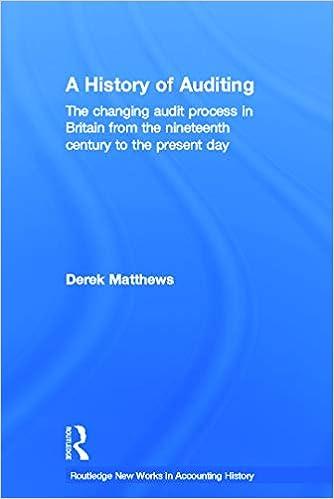Question
Assessment task 2 - Skills and Performance Activity Skills and Knowledge activity (Q & A) Objective: To provide you with an opportunity to show you
Assessment task 2 - Skills and Performance Activity
Skills and Knowledge activity (Q & A)
Objective: To provide you with an opportunity to show you have the required knowledge for this unit.
The answers to the following questions will enable you to demonstrate your knowledge of:
- Types of financial records:
- bank deposit documentation
- bank statements
- banking summaries
- business activity statements
- cheque books
- credit card transaction statements
- invoices
- journal entries
- labour and wages reports
- merchant statements
- merchant summaries
- transaction reports
- Types of budgets:
- cash budgets
- cash flow budgets
- departmental budgets
- event budgets
- project budgets
- purchasing budgets
- sales budgets
- wage budgets
- whole of organisation budgets
- Factors for consideration in the preparation of financial and statistical reports:
- cash flow
- commercial account activity
- commission earnings
- covers and financial return
- daily, weekly and monthly transactions
- expenditure
- income
- occupancy rates and financial return
- performance of department, project and/or products and services
- sales performance
- sales returns
- staff costs
- stock levels
- variance in income and/or expenditure
- wastage
- yield
- Use, contents of and formats for:
- budgets
- financial reports
- statistical reports
- Budget terminology
- Specific industry sector and organisation:
- use of budgets to control costs and enhance profitability
- importance of budget control
- techniques for maximising budget performance
- financial reporting procedures and cycles
- features and functions of accounting software programs used to manage budgets
Answer each question in as much detail as possible, considering your organisational requirements for each one.
All answers will vary depending on the learner and the organisation they work for but the learner should be able to answer each question competently.
- In your own words, explain what each of the following financial records show:
- Invoices
- Labour/wage reports
- Credit card transaction statements.
- Explain why having dedicated budgets for specific departments and projects can be useful (as opposed to only relying on a budget for the whole organisation).
Answer:
- Any changes that are made to the budget should be recorded so that future budgets can be made based on this information, rather than using the outdated information from the start of the year.
- A new department head may have different ideas and ways of the running the department and may need more budget in some areas and less budget in others.
- Why is it important to consider sales performance when monitoring budgets and preparing financial reports?
Ans:
It is important to consider sales performance when monitoring budgets and preparing financial because of these reasons:
- Expenses
- Revenue
- Cost
- What information is contained in the following document types:
- Budgets
- Financial reports
- Statistical reports?
- Explain what the following budgetary terminology means:
- Revenue
- Financial commitment
- Debt.
- Why is it important to promote budget control, and how can this enhance the overall profitability of your organisation?
Performance activity
Objective: To provide you with an opportunity to demonstrate the required performance elements for this unit.
A signed observation by either an approved third party or the assessor will need to be included in this activity as proof of completion.
This activity will enable you to demonstrate the following performance evidence:
- Manage a budget for a business over a three-month period that meets the specific business needs
- Undertake at least two of the following to inform management of the above budget:
- discussions with existing suppliers
- evaluation of staffing and rostering requirements
- evaluation of impact of potential roster changes
- review of operating procedures
- sourcing new suppliers
- Monitor income and expenditure and evaluate budgetary performance over the above budgetary life cycle
- Complete financial reports related to the above budget within designated timelines and using correct budget terminology
Answer the activity in as much detail as possible, considering your organisational requirements.
All activity answers will vary depending on the learner and the organisation they work for but the learner should be able to demonstrate their competency in the unit requirements.
As a workplace activity or simulated workplace activity (as directed by the assessor):
- Create a budget for an event or project that will last for three weeks or more. Throughout this period, you must show that you can create, monitor, and control the budget by doing the following:
- Show that you can work with colleagues to establish requirements and priorities (including staffing requirements and stock requirements)
- Use financial records to monitor expenditure and income on a regular basis
- Identify any variances and deviations, and react to them you may need to adapt the budget
- Complete financial reports to ensure control of finances, and to update others on the budgets status.
Step by Step Solution
There are 3 Steps involved in it
Step: 1

Get Instant Access to Expert-Tailored Solutions
See step-by-step solutions with expert insights and AI powered tools for academic success
Step: 2

Step: 3

Ace Your Homework with AI
Get the answers you need in no time with our AI-driven, step-by-step assistance
Get Started


